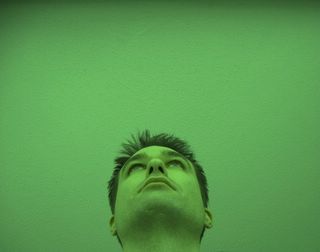Our town had this magical antique shop on a dead end street, down past two boarded up stores that used to be a bank and a used clothing store. A towering sign perched on the roof of the building read “Quiggly’s Antique Emporium”, spelled out in sequins pinned to the signboard so that they rippled and flashed in a breeze like the surface of water. Out front it had a twirling barbershop sign, an old church pew with so many names and profanities carved into it that it looked like a piece of bark. A sign shaped like an arm with a finger pointing towards the door said “Come Inside”.
A string of bells jingled when you came through the door. Just inside stood a tall wooden Indian, fingers curled as though clutching a fistful of cigars that had been smoked long ago, but when you walked past him you smelled tobacco.
You are always alone in Quiggly’s Antique Emporium. The owner, Quiggly, would only appear if you pounded on the bell at the counter; he was always tinkering away behind a display or buried out back restoring old furniture. He peered blindly through thick scratched glasses, a reek of turpentine and lacquer following him. Even the other customers were gone, no matter how many you had seen enter the store before you. It was as though each had disappeared into their own chosen era.
An old phonograph played scratchy music, voices crooning from decades ago yet lingering in the next room. Mixed in with the music were barely audible sounds of silverware on fine china, highball glasses tinkling with ice cubes, the undistinguishable din of laughter at a dinner party. In other booths you thought you heard the banter of baseball players, “batter batter batter swinga,” and the smack of a baseball into the worn leather pocket of an old glove. The vintage beaded dresses still looked as vibrant as though a flapper had just slipped out of it. Circus clown wigs and juggling pins, farm animal harnesses and bridles, Singer sewing machines and spinning looms, army knives and soldiers helmets.
The store held items from every family in town, and you weren’t truly considered a citizen until you had a part of your past holed up inside. Even though we were all afraid of Quiggly’s, we were drawn there nonetheless. We were searching for something we’d lost, something we wanted to understand, and each of us found our answers, in our own way. We felt at home among the items of the homes we’d lost.
Everyone finds something different. For some, bitterness and pain. For others, the pleading for forgiveness from their grandmother’s whicker wheelchair. For me it was always a reunion; from the ivory soap dishes came the smell of grandmother’s hands washed with Dove soap, the porcelain salt and pepper shakers shaped like hobos, the little black music box which played “Raindrops Keep Falling on My Head”. Uncle Bruce’s fishing gear leaned in the corner with my favorite lures that drew the lunkers out of the deep.
You had overstayed your welcome when the air grew chill and the glowing lights faded. It’s time to go, they seemed to say. Unseen hands ushered you towards the door and outside, where you are blinded by the sun, where it seems hardly any time has passed at all.
Friday, April 21, 2006
Subscribe to:
Post Comments (Atom)

No comments:
Post a Comment